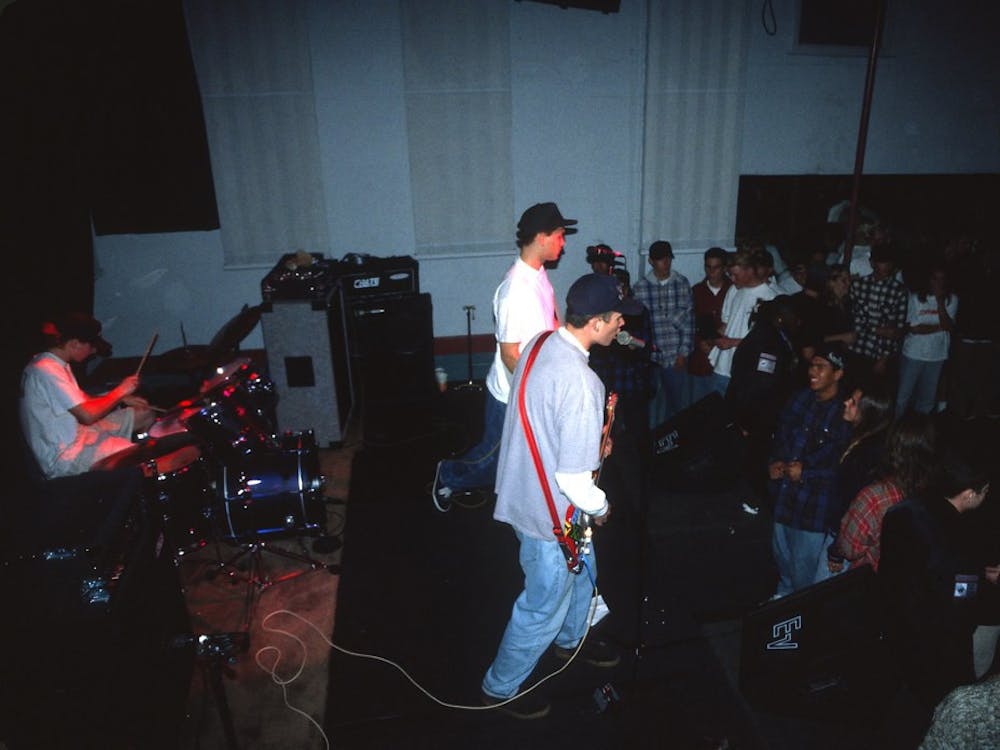Anti-establishment music has defined Western teenage culture for decades: From rock & roll to punk rock to hip-hop, the voices of youthful rebellion consistently dominate the music industry. But do these voices prevail as artists grow out of adolescence? How does maturity impact music designed for teens of past generations — kids who now have their own kids?
Last Friday, pop-punk band Blink-182 released its ninth and final album, titled “Nine.” Combining modern pop sounds with the emotional lyrics of punk music, “Nine” attempts to revive the buried art of punk rock. Unlike Blink’s 1999 hit album “Enema of the State,” flaunting aggressive guitars and raw voices, “Nine” exhibits a fragmented, and admittedly artificial, attempt to piece together ‘90s pop rock with current production techniques. It displays the decay of pop-punk and the struggle to create a nostalgic sound while appealing to modern markets.
Pop-punk is a sub-genre of the punk rock movement. Beginning in the early 1970s, punk rock bands such as the Ramones and Sex Pistols channeled the anti-establishment messages of the hippie movement into highly energized cries of teenage rebellion. Buzzsaw electric guitar riffs, punchy drumming and seditious lyrics defined the sound of the movement, as safety-pinned T-shirts, black leather jackets and ripped jeans defined its look. Using music and fashion to push gender boundaries and defy societal expectations, punks found community in nonconformity, a commitment to non-commitment.
The explosion of pop music shadowed punk rock throughout the 1980s. Sub-genres of punk, however, were only emerging: Grunge music — angsty, unpolished, unapologetic garage ballads mastered by bands such as Nirvana and Stone Temple Pilots — boomed in the early ‘90s. Grunge was not only an outlet for the perils of adolescence, it was a reflection of the individualism and sociopolitical apathy of Generation X. With Kurt Cobain’s raspy moan to “come as you are,” that was all you had to be: Not what your parents wanted you to be, not what school wanted you to be and not what businesses wanted you to be — just what you wanted to be.
Throughout the late ’90s and early 2000s, a brighter version of punk music evolved: pop-punk. Bands including The Offspring, Sum 41, Green Day and Blink-182 used simple melodies, vulgar lyrics and loud, unfiltered voices to bring garage angst to a wider audience. The melding of rebellious punk styles with catchy pop rhythms was irresistible to the adolescent psyche. It was a creation of pop punk not only as musical development, but as cultural rebirth. Cynical post-9/11 songs such as Green Day’s “American Idiot” and Sum 41’s “Still Waiting” reflect the revival of anti-establishment themes after a period of political apathy.
While pop punk contains similar attitudes and styles to its grunge predecessors, the fact that it is equally part pop as it is punk displays the inevitable transition to mainstream styles within the music industry. Fall Out Boy and Panic! At The Disco, for example — once the poster children of “emo” culture — have gradually shifted to pop styles to gain airplay and expand their fan base. While these are valid reasons to change musical styles, they are also destroying rock music. This destruction is epitomized in Blink-182’s “Nine.”
“Nine” is a self-aware farewell to the band and to the pop-punk era. The hi-fi, Auto-Tuned sound of “I Really Wish I Hated You,” for example, presents a dramatic difference from the lo-fi garage-band sound of the band’s earlier music. The use of reverb and other pop elements, though demonstrating musical development, diminishes the angst and rebellion that defined Blink’s career.
There is, however, an acknowledgement of its past and present sound. “Generational Divide” anxiously asks the audience, “Are we better now?” and “Blame It On My Youth” finds a middle ground between modern music and punk rock roots, highlighting the comfort of music in a world reeking of alcohol and despondence. Even “On Some Emo Shit,” with its artificial melody and synthetic drum beats, contains the melancholic and self-deprecating lyrics reminiscent of their late ‘90s hits. Although evidently produced in 2019, the lyrics invoke the same message that put Blink-182 in the spotlight 20 years ago: We all deal with heartache and stress and a longing to preserve our youth. We all feel isolated sometimes, but you are not alone.
Since lead singer Tom DeLonge’s 2015 departure from the band, Blink has lost its nasally whining about heartbreak and maturity. DeLonge’s signature sound didn’t make Blink incredible — it made them relatable. And in their new album, there is still a lingering sense of relatability, just not for teenagers. But how could anyone expect teenage angst from a group of middle-aged men? Why should we expect the pop-punk sound of the late ‘90s to prevail in 2019? As artists mature, so does their music. Perhaps changing musical styles over time is not about conforming to mainstream artists, but about rebelling against the past. This divergence is the essence of punk rock: a commitment to non-commitment.
Get The Chronicle straight to your inbox
Signup for our weekly newsletter. Cancel at any time.

